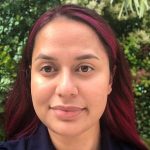
Reese Salmon
Indigenous Health Scholarship
Deakin University, VIC
Bachelor of Psychology
Scholarship Awarded 2022
Sponsored by:
Rotary Club of Murrumbidgee Canberra
How will I contribute to improving Indigenous health as a qualified medical practitioner or health worker?
As an Aboriginal woman in Australia, I am cognisant of issues faced by my people. I have chosen to become a health worker in the allied health field (Psychologist) to try to alleviate some of the stigma surrounding seeking mental health services in Indigenous communities. Having previously volunteered in a rural Aboriginal Community, I have witnessed the stigma surrounding mental health.
Some key influences that made me want to be a Psychologist are:
- I have experienced first-hand the devastation caused by severe mental health issues – having been affected by the suicide of a family member, this is a key driver for me to become a Psychologist. I have also witnessed the ongoing effects of trans-generational trauma, not only in my family but in the community. The ongoing adverse effects of colonisation on Indigenous peoples’ mental health is a particular interest of mine, and something I would like to potentially specialise in for my post-graduate studies.
- I would like to be a role model to younger generations. Being the first person to graduate from university in my family of 8 siblings has shown me the power of being a role model. I hope to encourage my younger siblings, nieces/nephews and cousins to not only become health professionals, but to show them that with perseverance their goals are attainable.
Some accomplishments I hope to achieve within my career as a health worker:
- As a health professional, within the next 10 years I would like to practice as a Psychologist in rural Indigenous communities that lack mental health services, or set up a services to allow these communities ongoing face-to-face sessions with Psychologists.
- Within the next 5 years I would like to work as a Psychologist in the criminal justice system, whether it be as an Indigenous well-being officer or as a prison Psychologist. I hope to be able to help rehabilitate prisoners and break the cycle.
Since 18 years old, I have continued volunteer for Indigenous causes wherever possible.
- Amnesty International – I volunteered as a research assistant to an Indigenous Rights Campaigner under the Community is Everything campaign, which looked at reducing the number of incarcerated Indigenous children in the justice system and raising the minimum age of criminal responsibility.
- Oodnadatta Volunteer Program – I completed the 3-month Oodnadatta program run by Australian Volunteers International (AVI). I went to a rural Aboriginal community called Oodnadatta (SA) to run/organise community projects and assist with literacy at the local school.
- South Africa Wallabies Exchange – I was selected for a 6-week Indigenous volunteer exchange program in which I helped build an eco-village for a rural town in South Africa. I also ran children’s activities and taught the community about Indigenous culture.
- I am currently a Tutor for the Deakin Institute of Koori Education – I hope to tutor Indigenous students in their first year of Psychology when I progress to my third year of study.
Current Progressive Report
This passing trimester I completed my final unit, Cross Cultural and Indigenous Psychology (Distinction grade, yay!) As an Indigenous Psychology student, it was nice to end my undergraduate degree on a subject directly focussed on my people. As usual I found myself balancing life, work and study – and on a personal front, I got engaged!
As I reflect on my degree, having started it during COVID lockdown as a little ‘side project’ in 2021, I am really proud that I was able to make time for it and continue to strive to be the best version of myself. Now as I look to the future, I find myself excited for the doors this degree will unlock for me. Currently I work as a Fraud Analyst for a government department – this job is not really me and I am looking forward to where I can work now that I have a psych degree.
Studying this last unit in particular has been a reminder of the importance of culturally responsive psychological practices. It inspired me even more to one day hopefully work in this field. For now, I can see myself taking a break from study before considering post-graduate options. Having done back-to-back degrees, the previous one being a Bachelor of Arts (majoring in Journalism and Criminology) that I started way back in 2015, I am keen to give myself a break (and savouring not having deadlines for once!)
Completing this final unit came with a mix of emotions – relief, pride, and anticipation. It marked the culmination of four years of learning and personal development. Balancing academic responsibilities and deadlines while preparing for my wedding and planning for life post-graduation has been both exciting and a little daunting. The support of the Rotary Club has been invaluable throughout this journey and given me freedom to take time off work at different stages for my studies (couldn’t have done it without them!!) Their belief in my potential has also been invaluable.
As I look forward to graduating in September and embarking on the next stage of my journey, I carry with me the knowledge I have gained and the ambition to help those around me.